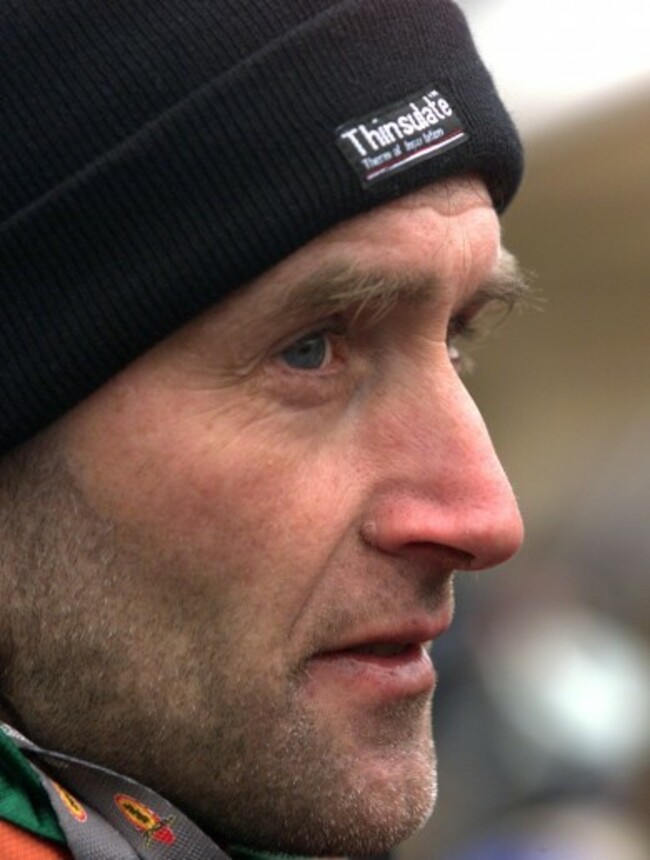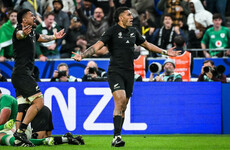LAST UPDATE | 22 Jan 2021
IF ONLY he could see it. If only Jerry Kiernan could wander into his local café in Ranelagh tomorrow morning, whip open the papers, and see how much he really meant.
In truth, he’d probably laugh, acutely aware of the irony that the only way he could steal the headlines from GAA stars he loved to critique was to go and pass away.
And as soon as he saw all those eulogies, all the tributes, that pencil-thin face plastered across the pages, he’d probably shake his head and throw it to the side, then move on and do something productive with his day.
There are many who knew Jerry Kiernan far better than me, and they can fill you in far more accurately on his eloquence, his educated mind, his acerbic wit. His slightly cranky, occasionally cutting exterior that hid in his core a heart of absolute gold.
But that’s not really the point of this column.
Because I, like most of you who will have watched Kiernan on TV, felt like I knew him. That was the impact he had, perched on that chair in the RTÉ studio, delivering his judgements on the performances of Irish athletes at major championships.
When they were good he was exalted, hyping them up in giddy excitement and putting in context just how damn good their performance really was. When they were bad, well, his blades would be sharpened long before they had reached the finish.
In an age of bland, carefully crafted TV analysis, where the chief priority is to avoid offence and to maintain friendships within the sport, Kiernan seemed a relic from a bygone era, a sharp-shooter who didn’t need to be liked, and who didn’t particularly care if you hated him.
In truth, that was why he was loved.
I spent most of Thursday afternoon on the phone to various folk in Irish athletics, athletes and friends and clubmates whose lives he’d touched in various ways. From Manchester, Ciara Mageean tried her best to hold it together as she spoke about the man who resurrected her career in 2012 and coached her to a European medal in 2016.
From Sligo, John Travers spoke about the man who had coached him to nine national titles, who his three-year-old son calls Grandad Jerry, who he had come to regard as a dad following the passing of his own father. There were times in Travers’ career when he even he bore the brunt of Kiernan’s critiques on TV, and what stood out was how Kiernan’s public persona matched up exactly with who he was in private.
There will be a few people who walk through your life and leave lasting footprints in your heart. Jerry Kiernan was one of those people. I feel truly blessed and privileged to have been able to call him my coach and friend.
— Ciara Mageean (@ciaramageean) January 21, 2021
Thank you Jerry, for everything. pic.twitter.com/FaxJPd27v0
There was no filter, no window dressing or mollycoddling or saying one thing but meaning another. Kiernan was an orator who knew the power of words and he wielded them with certainty and expertise, seasoning them with a healthy dose of curses when the situation demanded it — or even when it didn’t.
Through his work with RTÉ, he offended many an athlete over the years, questioning their temperament or their work-rate after a public failure on the sport’s biggest stages. He had his favourites, like us all, and such athletes were typically spared the worst of it, and then he had those he decided to skewer with unmerciful abandon.
Not everyone took it lightly, and when Kiernan criticised James Nolan after a disappointing run over 1500m at the Athens Olympics, calling him a dilettante, Nolan famously told RTÉ he didn’t put much stock in the words of a “cross-country slogger”.
That spat made for superb viewing, and lent an altogether-too-rare angle in athletics: proper, unfiltered friction in a sport where civility can often lead to apathy. Sitting in that chair, Kiernan knew the power of controversy and he also knew the vast majority of those watching hadn’t much of a clue about athletics.
So he didn’t dazzle us with jargon, he didn’t toe the safe line and say that athlete X “will be very disappointed” with performance Y. No, he called it as he saw it, the way the pundits would if his beloved Barcelona had just blown a 3-0 lead at the Nou Camp.
He possessed a vocabulary that seemed extracted straight from the classics yet and yet had the ability to both inform and greatly entertain the everyday armchair sports fan. He once described someone I know as a “solipsistic shithead”, and if, like me at the time, you’re wondering what solipsism is, it’s the theory that only the self exists.
Kiernan lived his life in the diametrically opposed end to that. For 40 years he taught at St. Brigid’s Boys School in Foxrock and to speak to those who were taught by him, you realise very soon he was far more than a teacher, but one of those once-a-decade mentors whose words, whose influence, stay with you in ways you’re still discovering many years later.
As a coach, there was no elitism in Kiernan’s ranks. He helped athletes to run four-hour marathons with the same considered care as he would an Olympian. The person was what mattered, far more than the performance.
There was little reliance on science, no paralysis by analysis. He’d sooner have you break a fine bottle of red wine over his head before getting bogged down in heart rates or lactate levels. His career had taught him the fundamentals of good distance-running and he stayed attuned to that throughout his life. Experience was his engine, intuition the wheel he used to steer it.
“It was the caveman approach: run, run, run, run,” Travers told me on Thursday. “That’s why we gelled. Miles work for me, speed work makes me flat, and Jerry was very good at picking what training you need.”
For Mageean, Kiernan was a rock to cling to in the various storms an athlete goes through in adolescence. Break-ups and broken bones, under-performances and crises in confidence – Kiernan was always there, sitting opposite her in that coffee shop on the Southside of Dublin, ready to lend an ear.
“He was so much more than a coach, he was a friend, like a father figure,” she said. “Words will never sum up what he means to me, he’ll never be replaced.”
Those who raced him have similar tales: how goddamn hard Kiernan was to beat when he was at his best. He represented Ireland 17 times as a senior, from 1975 to 1993, and won Irish senior titles from 1500m to the marathon — a freakish range that spoke to his class.
He was twice national cross country champion, a sub-four-minute miler, and a 2:12:20 marathoner, which he ran in the searing heat of Los Angeles at the 1984 Olympics. That was good enough to finish ninth, seven places behind his teammate John Treacy, who won silver.
“That was the greatest race he ever ran,” said Treacy. “How many sportspeople can you say that about? That they nailed the biggest performance on the biggest day? It was phenomenal.”
And yet, it was a performance few outside the closeted world of Irish athletics really came to appreciate, existing as it did in the shadow of Treacy’s silver. Perhaps that lack of understanding for his world-class achievement contributed to Kiernan’s distaste for the GAA, which he came to criticise many times and in many different ways over the years.
As a Kerryman, his achievements through the 1980s were always going to play second fiddle to the footballers, and that likely spawned in Kiernan an anger, one that leaked out as he critiqued the fitness levels, work rate and eulogising of inter-county athletes in what is, after all, a domestic sport.
His love for athletics, meanwhile, was undeniable, and as someone who spoke out again and again against the establishment — once labelling the Olympic Council of Ireland as a glorified travel agent — any criticism typically in that realm came from a knowledge that things could be better.
His life in sport was dedicated to making that happen, and what’s more, he did it all for free. He’d be there in Belfield, several times a week, in driving rain, in freezing winds, in glorious summer sun, lending his time and his wisdom to anyone who wanted it and not only did he not ask for a cent in return — he’d rebuff anyone who tried to offer it.
It’s no exaggeration to say that thousands of runners benefitted from his wisdom over the years, and who-knows-how-many students that passed through his classroom.
He may be gone, and for those of us whose lives he brightened, that wretched reality will take some time to set in.
At the age of 67, Kiernan has left the sport, he has left our screens and though that’s still too troubling a concept to truly comprehend, it’s worth remembering that a life isn’t really lost while its legacy lives on.
- Originally published 00.00, Friday, 22 January 2020.











What a great article. RIP
A true gent RIP
Raced against him a few times in the Ballycotton 10 road race. Well he ran 47mins and I ran 1 hour lol Jerry was king of the roads back in the 80s. Superb over all distances from 5miles to the marathon . Jerry’s superb 9th place in the 1984 LA Olympic marathon was overshadowed by John Tracy silver medal. Nonetheless it was a superb run. For a few miles two Irish man were on the leading bunch. Always loved his analysis on RTE. Condolences to his family
Always tuned into the rte analysis when he was on, you’d always expect that something just that little bit more interesting would be revealed! He always came across as a person who cared little enough about what you thought of him, but who cared a lot about the truth he perceived and then reported. He will be missed to us all, condolences to his family and friends. RIP
What a legend.. used to see him running along the roads of South County Dublin circa 82…as I trained for the Marathon…a giant among men as he sprinted into the distance…God Rest your soul Jerry
Gerry Mc Gowan
@Kenneth Finn: Well said. His passing leaves a huge void. He once gave me a 20 minute lecture in a pub on how soft my training schedule was. I was doing 70 miles a week. Huge character, great guy
A true gent, met him at Clonliff Harriers, always there to help anyone.
What a great Tributes to Gerry Kiernan. May he Rest in Peace.
Loved his analysis ,delivered honestly,with a depth of knowledge,and a beautiful voice,may he rest in peace.
Great article as always Cathal. Gave a great insight into the man! RIP
May he rest in peace! I will miss him from the TV cool knowledgeable and you knew he just loved the sport!